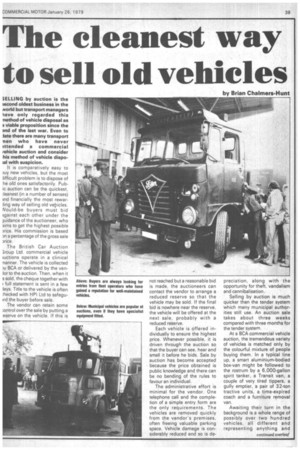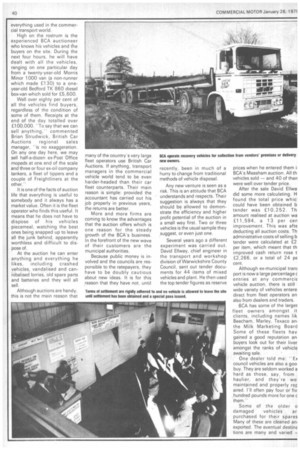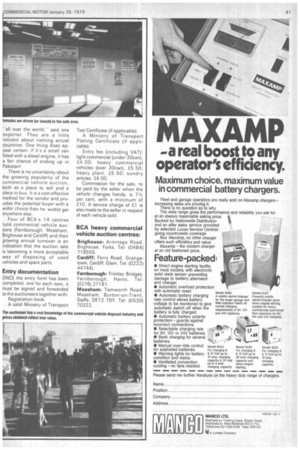The cleanest way to sell old vehicles
Page 41

Page 42

Page 43

If you've noticed an error in this article please click here to report it so we can fix it.
by Brian Chalmers-Hunt 3ELLING by auction is the :econd oldest business in the NorId but transport managers lave only regarded this Tiethod of vehicle disposal as 3 viable proposition since the and of the last war. Even to late there are many transport nen who have never Mended a commercial follicle auction and consider his method of vehicle dispo'al with suspicion.
It is comparatively easy to my new vehicles, but the most lifficult problem is to dispose of he ofd ones satisfactorily. Pubic auction can be the quickest, ;leanest (in a number of senses) tnd financially the most rewarling way of selling old vehicles. Nould-be buyers must bid )gainst each other under the 3uidance of the auctioneer, who aims to get the highest possible wice. His commission is based )n a percentage of the gross sale )rice.
The British Car Auction 3roup Ltd. commercial vehicle iuctions operate in a clinical nanner. The vehicle is collected )y BCA or delivered by the yenlor to the auction. Then, when it s sold, the cheque together with full statement is sent in a few lays. Title to the vehicle is often :hecked with HPI Ltd to safeguird the buyer before sale.
The vendor can retain some ;ontrol over the sale by putting a esen/e on the vehicle. If this is not reached but a reasonable bid is made, the auctioneers can contact the vendor to arrange a reduced reserve so that the vehicle may be sold. If the final bid is nowhere near the reserve, the vehicle will be offered at the next sale, probably with a reduced reserve, Each vehicle is offered individually to ensure the highest price. Whenever possible, it is driven through the auction so that the buyer can see, hear and smell it before he bids. Sale by auction has become accepted because the price obtained is public knowledge and there can be no bending of the rules to favour an individual.
The administrative effort is minimal for the vendor. One telephone call and the completion of a simple entry form are the only requirements. The vehicles are removed quickly from the vendor's premises, often freeing valuable parking space. Vehicle damage is considerably reduced and so is de preciation, along with the opportunity for theft, vandalism and cannibalisation.
Selling by auction is much quicker than the tender system which many municipal authorities still use. An auction sale takes about three weeks compared with three months for the tender system.
At a BCA commercial vehicle auction, the tremendous variety of vehicles is matched only by the colourful mixture of people buying them. ln a typical line up, a smart aluminium-bodied box-van might be followed to the rostrum by a 6,000-gallon spirit tanker, a Transit van, a couple of very tired tippers, a gully emptier,. a pair of 32-ton tractive units, a time-expired coach and a furniture removal van Awaiting their turn in the background is a whole range of possibly over two hundred vehicles, all different and representing anything and everything used in the commercial transport world_ High on the rostrum is the experienced BCA auctioneer who knows his vehicles and the buyers on the site. During the next four hours, he will have dealt with all the vehicles, ranging on one particular day from a twenty-year-old Morris Minor 1000 van (a non-runner which made £130) to a oneyear-old Bedford TX 860 diesel box-van which sold for £5,600.
Well over eighty per cent of all the vehicles find buyers, regardless of the condition of some of them. Receipts at the end of the day totalled over £100,000. -To say that we can sell anything," commented Brian Strudwick, British Car
Auctions regional sales manager, "is no exaggeration. On any one day here, we may sell half-a-dozen ex-Post Office mopeds at one end of the scale and three or four ex-oil company tankers, a fleet of tippers and a couple of Freightliners at the other."
It is one of the facts of auction life that everything is useful to somebody and it always has a market value. Often it is the fleet operator who finds this useful. It means that he does not have to dispose of his vehicles piecemeal, watching the best ones being snapped up to leave all the junk behind, apparently worthless and difficult to dispose of.
At the auction he can enter anything and everything he likes, including crashed vehicles, vandalised and cannibalised lorries, old spare parts and batteries and they will all sell Although auctions are handy, this is not the main reason that many of the country's very large fleet operators use British Car Auctions. If anything, transport managers in the commercial vehicle world tend to be even harder-headed than their car fleet counterparts_ Their main reason is simple: provided the accountant has carried out his job properly in previous years, the returns are better_ More and more firms are coming to know the advantages that the auction offers which is one reason for the steady growth of the BCA's business. In the forefront of the new wave of their customers are the municipal authorities.
Because public money is involved and the councils are responsible to the ratepayers, they have to be doubly cautious about new ideas. It is for this reason that they have not, until recently, been in much of a hurry to change from traditional methods of vehicle disposal.
Any new venture is seen as a risk. This is art attitude that BCA understands and respects. Their suggestion is always that they should be allowed to demonstrate the efficiency and higher profit potential of the auction in a small way first. Two or three vehicles is the usual sample they ,suggest, or even just one.
Several years ago a different experiment was carried out. David Ellway, chief engineer in the transport and workshop division of Warwickshire County Council, sent out tender documents for 44 items of mixed vehicles and plant. He then used the top tender figures as reserve prices when he entered them ii BCA's Measham auction. All th vehicles sold — and 40 of then were well over tender price.
After the sale David Ellwa did some more calculating. H found the total price whic could have been obtained b tender was £10,252. Th amount realised at auction wa £11,594, a 13 per cen improvement. This was afte deducting all auction costs. Th administrative costs of selling b tender were calculated at £2 per item, which meant that th improved cash return rose t £2,266, or a total of 24 pc cent.
Although ex-municipal trans port is now a large percentage c entries at any commerciE: vehicle auction, there is still wide variety of vehicles entere direct from fleet operators an also from dealers and traders.
BCA has some of the larges fleet owners amongst it clients, including names lik Beecham, Marley, Texaco an the Milk Marketing Board Some of these fleets hay gained a good reputation an buyers look out for their liver amongst the ranks of vehicle awaiting sale.
One dealer told me: "Ex council vehicles are also a goo, buy. They are seldom worked a hard as those, say, from haulier, and they're we maintained and properly rep aired. I'll often pay four or fiv .hundred pounds more for one c them.
Some of the older o damaged vehicles ar purchased for their spares Many of these are cleaned an exported. The eventual destinz tions are many and varied
all over the world,said one exporter. They are a little reticent about naming actual countries_ One thing does appear certain: if it's a small van fitted with a diesel engine, it has a fair chance of ending up in Pakistan!
There is no uncertainty about the growing popularity of the commercial vehicle auction, both as a place to sell and a place to buy. It is a cost-effective method for the vendor and provides the potential buyer with a Nider choice than he wobld get 3nywhere else.
Four of BCA's 14 centres hold commercial vehicle auctions (Farnborough, Measham, Brighouse and Cardiff) and their growing annual turnover is an indication that the auction sale is becoming a more acceptable way of disposing of used vehicles and spare parts.
Entry documentation
ONCE the entry form has been completed, one for each item, it must be signed and forwarded to the auctioneers together with: Registration book.
A valid Ministry of Transport Test Certificate (if applicable).
A Ministry of Transport Plating Certificate (if applicable).
Entry fee (including VAT): light commercial (under 30cwt), £4.00; heavy commercial vehicles (over 30cwt), £5.50; heavy plant, £5.50; sundry articles, £4.00.
Commission for the sale, to be paid by the seller when the vehicle changes hands, is 71/2 per cent, with a minimum of £10. A service charge of £1 is also made to the seller in respect of each vehicle sold.
BCA heavy commercial vehicle auction centres:
Brighouse: Armitage Road, Brighouse, Yorks. Tel: (0484) 718555.
Cardiff: Ferry Road, Grangetown, Cardiff, Glam. Tel: (0222) 44744).
'Farnborough: Frimley Bridges, Farnborough, Hants. Tel: (0276) 27161 Measham: Tamworth Road, Measham, Burton-on-Trent, Staffs. DE12 7DY. Tel: (0530) 70322












































































































